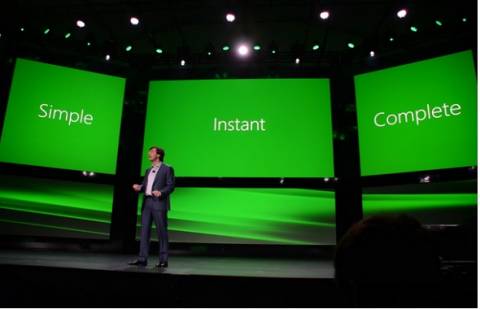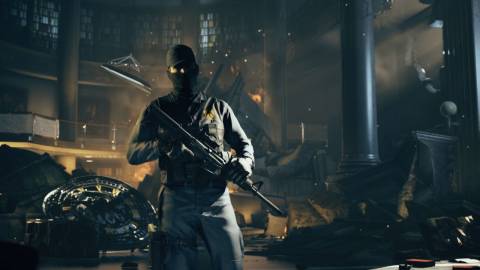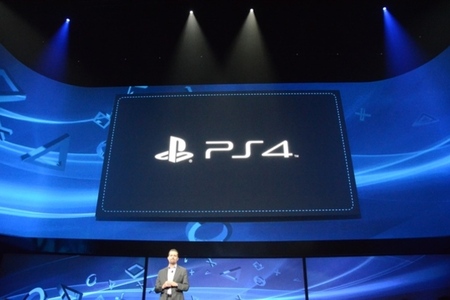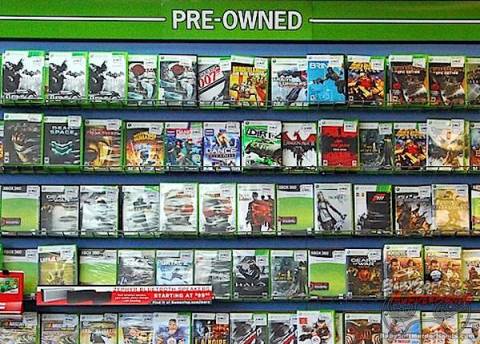A few months ago, if you'd told me Microsoft would completely annihilate what positive momentum it had going into E3 with an awkward series of awkwardly contradictory PR messages, I wouldn't have thought it possible. Then, this past week happened, and suddenly I don't know what to think anymore.

Following Tuesday's unveiling of its new next-generation console, the Xbox One, a lot of people on the Internet are very upset at Microsoft. Not just in the typical ways one of the Internet typically gets upset when a corporate event meant to showcase new technology fails to yield the precise types of products and features that said person expects--nay, demands. Rather, the core gaming audience effectively revolted at the prospect of Microsoft's new machine, the games (or perceived lack thereof), and new media technologies Don Mattrick, Phil Harrison, and the rest of the console maker's revolving door of tie-less suits trumpeted for a solid hour this past week.
Nobody seems to have expected this kind of vitriolic reaction. Some vitriol, sure, but outside of the mainstream press (who were ostensibly the target of this particular event), nobody seemed very happy about the Xbox One by the time Wednesday morning rolled around.
Granted, by the time the sun came up on Wednesday, nobody seemed entirely sure what Microsoft had even said about its new system. The core messages were relatively clear--the box is powerful, Kinect is better (and now required), it can do live television, and it will have Call of Duty, because of course it will--but the lingering questions that have been plaguing Microsoft's non-messaging for the last few months were still lingering. If anything, they became increasingly mucked up as time went along. The question as to how the system might handle used games turned into an outright debacle as mixed messages came from various interviews at the event ("There could be a fee involved!") and Microsoft's own support staff ("There are no fees involved!"). On the always-online subject, Phil Harrison suggested it would require a check-in with an Internet connection every 24 hours. Now, Microsoft PR is just citing that as a "possible scenario." In the few instances where clear answers were given, they weren't often what the dedicated gaming audience wanted to hear.
For a company that has spent an abnormally long amount of time waiting to show the world its new hardware, Microsoft's post-event chatter seemed confused, addled, and utterly unsure of its own messaging. That's sort of bizarre when you consider what a targeted attack the event itself was. Some of the anger toward Microsoft's event is genuinely unwarranted, specifically because the company had been quite up-front about the fact that this conference was for a broader, mainstream audience. The event the core audience was hoping for, the one with lots of games and less talk about ancillary things like TV signals and NFL partnerships, would be coming at E3. It said this several times, in fact, so if you were one of those people screaming "BUT WHERE ARE THE GAMES?!?" at your screen, you likely did this for naught. Based on Microsoft's own words, we should expect to see quite a few games at E3. Whether they'll be any good or not, we obviously don't know, but proclaiming that Microsoft has instantly abandoned providing interesting games for the audience that helped buoy the Xbox brand for more than a decade seems, at best, premature.
Of course, Microsoft did itself no favors by not offering up any minor concessions to the core audience this week. Microsoft's messaging was hyperfocused on the Xbox One as an all-purpose entertainment center, and with only an hour to cram in what it could, it chose to stick to the easy targets. When it did talk about games, it talked about a Call of Duty sequel and a bunch of EA Sports games. Forza Motorsport 5 was Microsoft's only big franchise to make an appearance--unless, of course, you count Steven Spielberg's vaguely interested-sounding announcement of the Halo live-action series he's stamping his name on. The Remedy reveal presumably would have been Microsoft's offering to satiate the core gaming masses, but the trailer shown was so opaque, confusing, and downright nonsensical that nobody seemed to get any kind of impression out of it whatsoever.

But again, with only an hour to broadcast a message aimed at an audience with an incredibly diverse array of needs, interests, and financial capabilities, Microsoft's conference wasn't really a disaster. It was focused, moved from bullet point to bullet point with relative ease, and the personalities on stage (such as they were) managed to avoid doing anything too hilariously blundering. Really, the problem is what came after. No one at Microsoft should have been surprised that questions from the press members in attendance skewed toward the many, many rumors that had surfaced in the last few months. Since Sony announced the PlayStation 4 in February, all we've talked about is how Microsoft might counter that unveiling. As we waited and waited for Microsoft to finally show its hand, dozens of writers have written lengthy missives about the most hot-button rumors over and over and over again. You couldn't have telegraphed what press members were going to ask harder if you'd actually sent Microsoft a goddamn telegraph with all the questions on it.
The total lack of coherent messaging from Microsoft on oft-talked about topics like always online and the used games market is really the most insulting thing about last week's whole debacle. I can accept an hour-long press conference that is decidedly not for me, but when you offer the press hours upon hours to talk to executives, try out the device, and basically just mill about talking about what they've seen, I don't understand how you don't spend the entire few weeks prior drilling exact messaging into the heads of anyone who might even think about talking to press. Even if the answers aren't what we want to hear, you deflect. You say that information is forthcoming. And eventually, Microsoft did, albeit after many of the less-pleasing rumors were essentially confirmed by people like Phil Harrison, before becoming decidedly less confirmed later that same day by people like Phil Harrison.
Some of that vagueness likely stems from Microsoft not being entirely ready with all its different service plans. It likely has solid ideas of how it expects to handle things like used games, online checks, and whatever else. But those things could very easily diverge from their current road map sometime between now and the holiday season, and to promise one thing, and then end up doing another, never goes over very well.
Except, that's sort of what happened anyway. With messaging unclear and executives either going off the reservation or just talking nonsense (or both), then being quietly "corrected" by PR later on, it presents an image of a company disorganized; fractured, even. Whether or not you believe the "six months behind" rumors as they've been presented in recent weeks, you have to admit that such disorganization seems fitting with that scenario.
As bad as Microsoft's messaging was, it was especially fatal given the overall tone and tenor of the event--one of absolute, unflappable confidence. Again, as much as you might not have liked the content of the Microsoft presentation, its laserlike focus on the features it believed were most important to the mainstream audience felt consistent with a company that acted like it had nothing to prove. Even Don Mattrick, who has often presented a stiffer, less slick stage presence to previously over-groomed executives like J Allard, seemed completely in his element. Microsoft was talking like a company that felt it had all the momentum going into E3, and foresaw no scenario in which that would change, thanks to its various new innovations.

In fact, it most immediately reminded me of the tone struck by Sony during its PlayStation 3 roll-out. That's a comparison others have made before, but this week really solidified it for me. Sony, after having led for two solid console generations, built the PlayStation 3 largely around the notion that developers, publishers, and players alike would flock to their new system simply because it had the word PlayStation branded on it, and that it was super-duper powerful. While the PlayStation 3 was by no means the total incompetent disaster some make it out to be (in worldwide sales, it's practically neck-and-neck with the 360 at this point), Sony did spend a good chunk of this generation staring up at both Microsoft and Nintendo, a position it was hardly accustomed to as the primary leader for the two generations prior.
Perhaps as a result, Sony's PlayStation 4 press event was anything but preening in tone. Practically from the word go, Sony essentially admitted that the PlayStation 3 had problems, and that the PlayStation 4 was very much about addressing those problems. They spoke of an easy-to-develop for system architecture (a far cry from the clusterfuck that was the Cell processor), touted support from numerous developers and publishers ranging from Square Enix on down to indie stalwart Jonathan Blow, showed a few actual game demos, and basically presented a console that was all about making the PlayStation brand better than what it had been. Compared with Microsoft's presentation, Sony's conference was practically an act of contrition.
Microsoft, on the other hand, seemed either unaware, or uninterested in the problems of the 360 era. Granted, the Xbox 360 didn't have the same developmental challenges that Sony did, but areas like Xbox Live Arcade (which is effectively being discontinued), the company's disinterest in allowing indies to self-publish (nothing is changing there, apparently), and system breakage (it's not like the red ring of death disappeared all that long ago) were mostly ignored. Instead of those problems, Microsoft (barely) addressed new problems, like the used games market, and backward compatibility.
It also did this with the absolute minimum display of sympathy or understanding for the consumer. The company keeps saying it has a "plan" for used games, though if it's anything like the one MCV details in this report, there is the distinct possibility that retailers may simply give up on used sales as a viable revenue stream. The merits of what Microsoft will/won't do to the used market is a whole other topic for another day, but even if Microsoft did have a decent, consumer-friendly solution to negate the losses suffered by game makers at the hands of used game retailers, they'd have a hell of a time convincing anyone at this point.
And backward compatibility? Microsoft just says no, because the architecture is different, and therefore that would be too hard to pull off. Mattrick's "If you're backward compatible, you're really backward" comment is one of those things that probably sounded really clever and funny in his head, though comes off as incredibly dismissive when spoken aloud. Never mind that the 360 is a system that is perhaps known best for its ability to self-destruct on a whim, which puts a lot of people with extensive 360 libraries in a precarious position going forward.

By not having solid answers to questions people have been asking publicly for months, Microsoft has painted themselves into a strange, unfortunate corner. Again, I have no problem with the basic content of what Microsoft showed. As Wired's Chris Kohler smartly noted this week, game consoles are in a terrible position right now, and the entire market is exceedingly uncertain. Microsoft's appeal to the casual player who wants an all-purpose entertainment device for the future isn't some grand betrayal, but more likely a savvy play by a company trying to weather an inevitable storm. The problem is, it failed to present that information to its dedicated audience in a way that made them feel like they were even part of the equation.
Now, short of a strong showing of awesome games at E3 turning public opinion around, Microsoft will have to spend the summer explaining to its audience why its console isn't the soul-sucking, anti-consumer machine it's suddenly being made out to be (which it may very well be, in fact, but we just can't be certain yet). For my part, I'm still reasonably hopeful that the games will deliver, and that both the PS4 and Xbox One will be machines worth getting excited about. The race just seems a hell of a lot closer now than I expected it would be back in February.
What a difference a few months makes.
--A